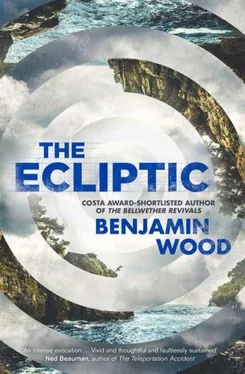For a moment, Mac said nothing. I could not tell if she was glad or dispirited. She tightened her fist around the pages, closing her eyes, and when she blinked them open again, they were glassy and mapped with tiny lines. ‘You have no idea how much it means to hear that, Knell. Just to know it made you feel something. Thank you. That was all I needed.’
‘Wait until you hear my notes on the punctuation.’
She smiled. ‘Don’t ruin it.’
‘Does this mean we can finish our dinner in peace?’
‘OK, but Quickman has to tone down the sanctimony. It’s getting out of hand.’
‘I’ll speak to him about that.’
‘Good.’
We headed back to the mess hall. ‘What kind of name is Lindo, anyway?’ I said.
‘I don’t know. Ask the provost.’
‘Hard to take a man seriously with a name like that.’
But Mac had already tuned out. She was hesitating at the threshold, studying her pages. ‘You really think there’s something worth developing here?’
With my hand on my heart, I said, ‘I’d stake my sponsor’s life on it.’
‘God, it’s such a relief. I can’t tell you how much better I feel.’ She edged away. ‘I might just go to my room and dig out the rest of the draft. Carpe diem and all that.’
‘You’re not going to stay and eat with us?’
She started to backpedal. ‘No, I’ve lost my appetite. Give my pudding to Tif.’
‘That’ll go down well.’
And it was then, as Mac was heading back across the landing, that a surge of footsteps came up the stairway behind us. There was such a frantic energy to the noise, it seemed as though some forest animal had been loosed inside the mansion. But a familiar shape revealed itself — a head of brown hair, a bulky set of shoulders. It was Fullerton. He went dashing up the stairs so fast he could not control his feet. A toecap caught on the very last step, tripping him. His body hurtled forwards, skidding. Knees and elbows slapped the parquet, but he rose quickly to his haunches, stilling his breaths.
‘Are you OK?’ Mac asked from the corridor.
He seemed to be startled by the sound of her voice, shifting his head in her direction. ‘Hello? Who’s there?’
‘It’s MacKinney,’ she said. ‘I’m right here.’
‘Hello? Is someone out there?’
I stepped closer. ‘Fullerton, it’s us . It’s Knell and MacKinney. Are you all right?’ But when he heard my voice coming from the other side of the room, a greater panic wracked him. He stood gawping at the stained-glass lampshade above his head, as though fearing it would drop. He wiped the spittle from his chin, checking his fingers. ‘I think I’m bleeding,’ he said. ‘I don’t have much time. How do I get out?’
‘You’re fine,’ Mac told him.
‘ Please . How do I get out?’
‘Calm down there, sunshine. You’re not making any sense.’ She turned to me, her face bent with concern. ‘He must’ve hit his head or something.’
‘Just tell me which stairs to take,’ the boy went on. ‘Are you there?’
‘Fullerton, we’re standing right in front of you,’ I said. ‘Stay still. I’m coming to help you.’ Slowly, I moved into his path, not wanting to alarm him.
‘You’re so faint. Please — how do I get out?’ He began to peer at the ceiling, turning in circles.
I was near enough to touch him now, and I held my hand out, hoping he would take it. But, although his eyes were locked wide open, he did not acknowledge me. I waved my arms and, still, he could not see me. ‘He’s sleepwalking,’ I said to Mac. ‘Has to be.’
‘Tripping, more like,’ she said. ‘Look at those pupils — he’s on something.’
‘Hello? Are you there?’ the boy called now. ‘Tell me where to go. Please .’
Mac turned. ‘I’m going to get Ender.’
‘No, wait.’ I spoke very loudly and clearly to the boy. ‘Go back to where you started. We’ll come and fetch you.’
But the boy just shouted to the ceiling: ‘Hello? Please — anyone there?’ Then, under his breath, he said, ‘ Fuck .’ He checked his mouth for blood again, and hurried forwards. I had to step aside to let him past.
The conversations in the mess hall did not quieten and he staggered up to the serving pass. He browsed the leftovers, lifting every dish to check what lay beneath, getting the run-off on his hands. Whatever he was seeing, it was not food. He began to rummage the drinks table behind him, pushing teacups aside and knocking cola cans, until he caught sight of the ayran pots and gathered them all in his clutches.
A few of the short-termers noticed him then. One of them said, ‘Hey, save some for the rest of us!’ Another said, ‘Your shoelace is untied!’ They were smirking at each other. But Fullerton took no notice, or did not receive them. He marched back through the mess hall, brushing past Mac and me in the doorway. He was muttering to himself, counting his steps: ‘. . fifty-three, fifty-four, fifty-five, fifty-six. .’ We followed him onto the landing. He scurried off through the ruddy light, down the first staircase. ‘. . seventy-eight, seventy-nine, eighty.’ He stopped at the window and stacked the cardboard ayran pots on the ledge in a single column. ‘What is he up to?’ Mac said. We watched him rip the lid off the topmost carton and course down the steps with another one still in his grip.
For a long moment, we could only hear his presence on the floor below, the ricochets of him bounding through the house. Then the last ayran pot came spearing up towards the window in a blur. It clattered straight into the stack and burst against the glass. Great shocks of liquid sprayed up and sideways, over the curtains, the wallpaper, pooling on the sill. The radius of the splash was so wide that it dotted my shoes. There came a whoop of exaltation from the hallway beneath us.
By the time we reached the lobby, the boy was gone. The front door was hanging open and there was a sloppy glob of cinnamon gum pushed into its keyhole. Outside, the night appeared so empty and permanent. ‘Well, I suppose the provost was wrong,’ Mac said, coming up behind me. ‘That lad needs more than just our supervision.’

I fretted a great deal about Fullerton that night and it took all my resolve to not pay a visit to his lodging on the way back to my studio. In the end, I reasoned he was better left alone. I was still convinced that he had been sleeping on his feet throughout the episode, but I could tell that Mac believed otherwise. She did not accuse the boy outright, nor did she raise any suspicions with Ender. Instead, she kept reminding me of how fixed the boy’s pupils had been. ‘I’ve seen that spaced-out look before,’ she said, as we helped to clean the boy’s mess from the windowsill. ‘That’s all the explanation I need.’ But this made very little sense to me.
There was no place drier than Portmantle: we took soluble aspirin for headaches or nothing at all, and even Gülcan’s rubbing alcohol was kept in a locked box in the provost’s office with all the emergency medicines. It was well understood that artists who relied on substances to pique their creativity were not accepted at the refuge; sponsors were made to vouch for the sobriety and moral character of all the newcomers before they arrived; and every guest was told the same cautionary tale about Whitlock, a fabled resident from the past, who had been caught drinking lawnmower diesel in the outhouse and was immediately ejected from the grounds — no documentation to secure his passage at the border, no help from the provost, not even a farewell handshake. (True or not, the implications of this story echoed long and loud.) Besides, I was sure the boy’s possessions had been searched on his very first day, because he had made a point of complaining to me about it, and even his cigarette packet had been empty when he had offered it to Quickman that afternoon in the library. To me, the boy’s strangeness was innate, not chemically induced. And I did not believe he would be impetuous enough to jeopardise his place at Portmantle for the sake of a fleeting high.
Читать дальше













